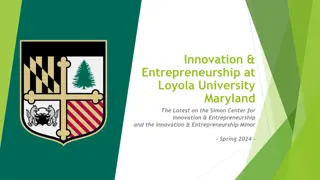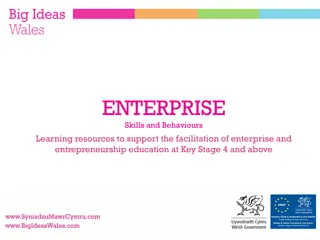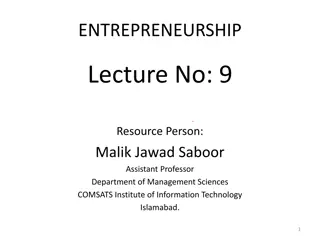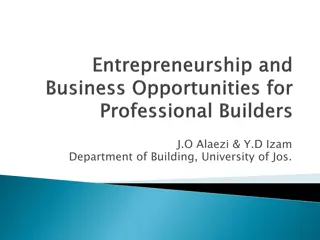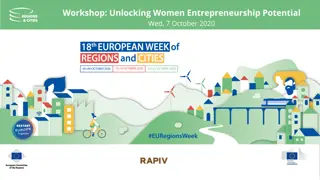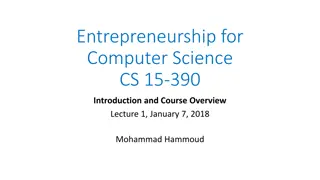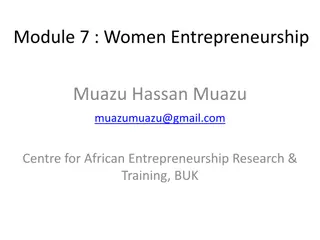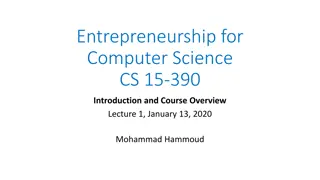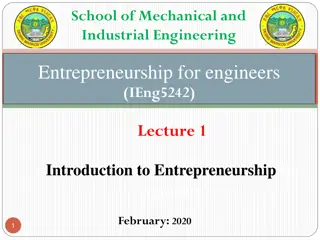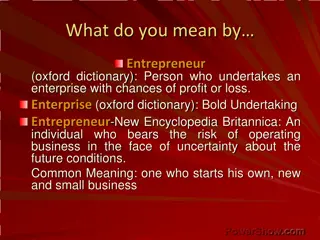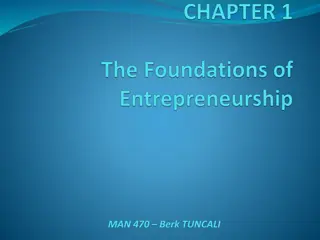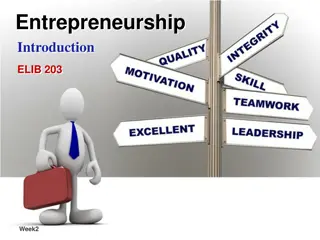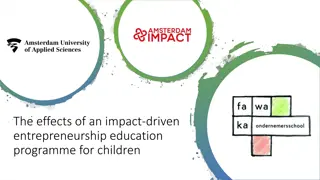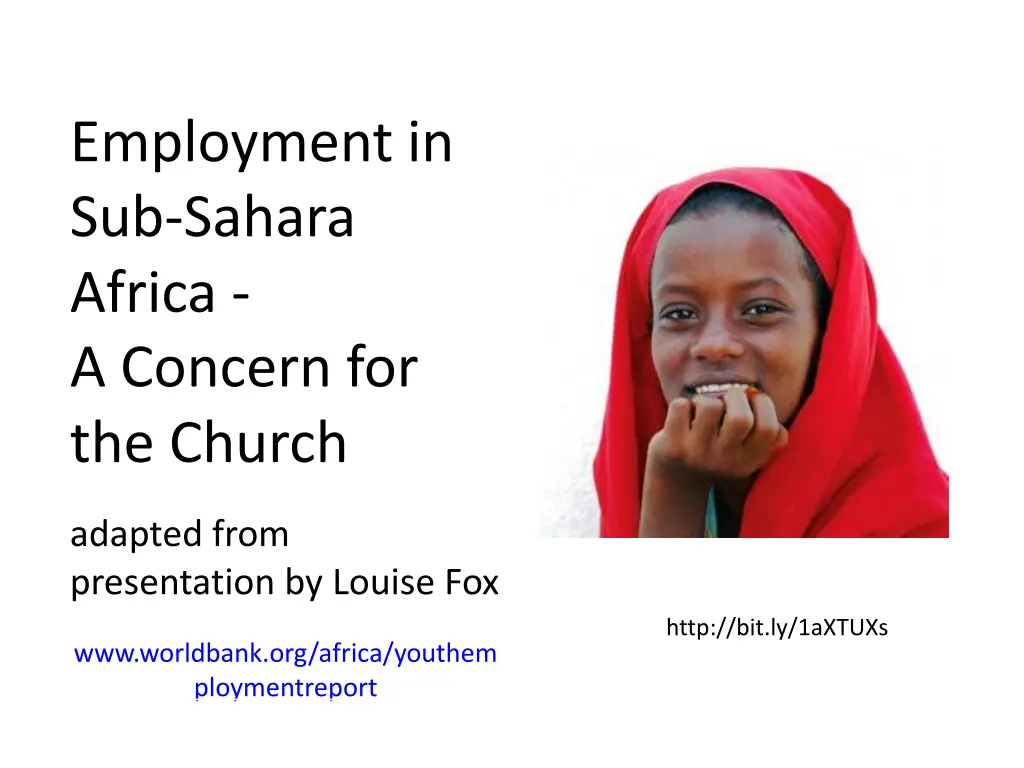
Youth Employment Challenges in Sub-Saharan Africa
Youth employment remains a pressing issue in Sub-Saharan Africa, with millions entering the labor market yearly. This article discusses the need for business climate reforms, education enhancement, and infrastructure development to improve young people's earnings. The church, along with governments and NGOs, plays a crucial role in addressing these challenges. Strategies for promoting skills development, especially in agriculture and non-farm enterprises, are highlighted as key solutions.
Download Presentation

Please find below an Image/Link to download the presentation.
The content on the website is provided AS IS for your information and personal use only. It may not be sold, licensed, or shared on other websites without obtaining consent from the author. If you encounter any issues during the download, it is possible that the publisher has removed the file from their server.
You are allowed to download the files provided on this website for personal or commercial use, subject to the condition that they are used lawfully. All files are the property of their respective owners.
The content on the website is provided AS IS for your information and personal use only. It may not be sold, licensed, or shared on other websites without obtaining consent from the author.
E N D
Presentation Transcript
Employment in Sub-Sahara Africa - A Concern for the Church adapted from presentation by Louise Fox http://bit.ly/1aXTUXs www.worldbank.org/africa/youthem ploymentreport
Fact: Africa in a Young Continent and will remain so Sub-Saharan Africa East Asia and Pacific South Asia 80+ 80+ 80+ 70-74 70-74 70-74 60-64 60-64 60-64 50-54 50-54 50-54 40-44 40-44 40-44 30-34 30-34 30-34 20-24 20-24 20-24 10-14 10-14 10-14 0-4 0-4 0-4 Male 2015 Male 2015 Male 2015 -100-80 -60 -40 -20 0 20 40 60 80 100 Population in millions Male 2035 -100-80 -60 -40 -20 0 20 40 60 80 100 Population in millions Male 2035 -160-120 -80 -40 Female 2015 0 40 80 120 160 Female 2015 Female 2015 Population in millions Male 2035 Female 2035 Female 2035 Female 2035 2
1. Eleven million youth are expected to enter Africa s labor market every year for the next decade. 2. Despite rapid growth in formal wage sector jobs, the majority of these youth are likely to work on family farms and in household enterprises, often with very low incomes. 3. To boost young people s earnings, governments need to hasten overall business climate reforms, strengthen basic education, and make land, infrastructure,
Churches need to be aware and interact with government, NGOs and aid agencies about the issue YE is about building skills through improving the quality of education, as well as behavioral and business skills A wide ranging agenda with no simple answers YE is about agriculture where strategies exist but have not been implemented, and could benefit from a youth lens YE is about household non-farm enterprises where few strategies exist - 50 million households YE is about helping youth overcome multiple constraints, including those that especially hold back particular groups such as young women
Two types skilled 2 types of entrepreneurs: well / less educated professional / less 2 focus areas : Christian missionary business / family business 2 areas of business : regular / ICT4D 2 area of focus: same culture / cross-cultural 2 exposures to work: more experience / less experience 1. Build the entrepreneurial capacity of your unit Start by gathering information from Spirit-filled Christian business persons NGOs, Aid agencies Christian and non-Christian Learn the entrepreneur space or Ecosystem - Map it out of your country, region, or city. Be organized; act in unity? Why? 2. Two pronged training: Foundation for Christian business Christian business for church members Christian business as mission / Kingdom building
Caveats Entrepreneurship can be hard, only 1 or 2 out of 20 persons succeed. It helps to have work experience (but not totally necessary). It is NOT the ONLY solution to building support For mission work, one of the best uses is in areas that require Creative Access and where building relationships is necessary Do NOT think of business believers only as a source of money. They can be meaningfully engaged in ministry of evangelism, church planting, and discipleship Do not give in to the temptation of a pretend business
Worldly Entrepreneurship: A process by which self-driven individuals participate in a free market economy for the purpose of creating wealth for themselves and controlling resources Biblical Entrepreneurship (BE): A biblically-based process of identifying opportunities, taking calculated risks, solving problems and exercising business stewardship for biblical profit. Kingdom Business: God s business, managed God s way, by God s steward, for God s purposes in the world.
Biblical Profit: The spiritual and natural gain remaining after all costs are deducted from a business transaction or the total income of the business. Kingdom Business: God s business, managed God s way, by God s steward, for God s pur poses in the world.
Kingdom Business: Search for: Nehemiah Project international Patrice Tsegue Regent Center for Entrepreneurship Kenya, Uganda, other countries
Three modules Part I: Introducing Biblical Entrepreneurship BE Entrepreneurship Attitude BE Character How to identify opportunities How to take calculated risks How to Solve Problems Understanding Stewardship Understanding Biblical Profit Goals and Responsibilities Part II: Tools of Business Part III: Developing your Business Plan




